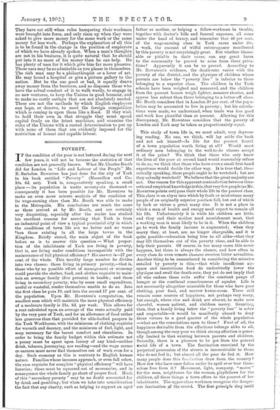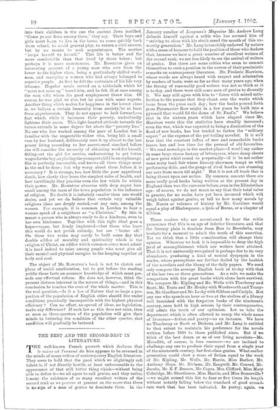POVERTY.
IF the condition of the poor is not bettered during the next few years, it will not be because the statistics of that condition are not generally known. What Mr. Charles Booth did for London in " Life and Labour of the People " Mr. B. Seebohm Rowntree has just done for the city of York in his book entitled " Poverty " (Macmillan and Co., 10s. 6d. net). York is, comparatively speaking, a small place — its population is under seventy-six thousand consequently it has been possible for Mr. Rowntree to make an even more minute analysis of the condition of its wage-earning class than Mr. Booth was able to make in the Metropolis. His conclusions are much the same as those arrived at by Mr. Booth, and are certainly very disquieting, especially after the reader has studied his excellent reasons for asserting that York is from an industrial point of view a typical provincial city in which the conditions of town life are no better and no worse than those existing in all the large towns in the Kingdom. Briefly stated, the main object of the book before us is to answer this question — What propor- tion of the inhabitants of York are living in poverty, that is, are living under conditions incompatible with the maintenance of full physical efficiency ? His answer is-27 per cent. of the whole. This terribly large number he divides into two classes: those living in primary poverty,—that is, those who by no possible effort of management or economy could provide the shelter, food, and. clothes requisite to main- tain an average family (five persons) in health ; and those living in secondary poverty, who by some small expenditure, useful or wasteful, render themselves unable to do so. Into the first class he puts 10, and into the second 17 per cent. of the population. Upon Mr. Rowntree's computation, the smallest sum which will maintain the mere physical efficiency of a moderate family is 21s. 8d. per week. This allows for a rent calculated upon an average of the rents actually paid by the very.poor of York, and for an allowance of food rather less generous than that provided for able-bodied paupers in the York Workhouse, with the minimum of clothing requisite for warmth and decency, and the minimum of fuel, light, and soap necessary for the barest comfort and cleanliness. In order to bring the family budget within this estimate not a penny must be spent upon luxury of any kind—neither drink, tobacco, journeying, nor reading—and the wage earner or earners must never find themselves out of work even for a day. Such economy as this is contrary to English human nature. Families whose incomes approach, or even fall oelow, the sum requisite for complete "physical efficiency" will have luxuries; these must be squeezed out of necessaries, and in consequence the whole family go short of proper food. Much of this " secondary poverty " may be no doubt accounted for by drink and gambling ; but when we take into consideration the fact that any charity, such as helping to support an aged
father or mother, or helping a fellow-workman in trouble, together with doctor's bills and funeral expenses, all come under the head of luxury, and remember that 46 per cent. of the wage-earning class in York earns under 30s. a week, the amount of wilful extravagance manifested by this poverty is not surprisingly great. But whether blame- able or pitiable in their cause, can any great harm to the community be proved to arise from these priva- tions? Apparently it can be so proved. According to Mr. Rowntree's evidence, the death-rate varies with the poverty of the district, and the physique of children whose parents are below the " poverty line " is inferior to those belonging to a superior class. The children in the York schools have been weighed and measured, and the children from the poorest homes weigh lighter, measure shorter, and appear less robust than those belonging to a better-off class. Mr. Booth considers that in London 30 per cent. of the popu- lation may be accounted to live in poverty ; but his calcula- tions were made, we understand, when trade was less good and work less plentiful than at present. Allowing for this discrepancy, Mr. Rowntree considers that the poverty of London and York may be taken as proportionately equal.
This study of town life is, we must admit, very depress. ing reading. No one, we think, will lay aside the book and not ask himself—Is life for the poorest fourth of a town population worth living at all ? Would most ordinary men belonging to the well-to-do classes accept it at the price ? We think that those who only know the lives of the poor at second hand would reasonably refuse to do so; we think that those who have even a small first-hand experience would decide the other way. It is true that, theo- retically speaking, these people ought to be wretched; but are they actually wretched? We believe that the great majority are not. One reason• for this apparent contradiction between theo- retic and empirical knowledge is this, that very few people (as Mr. Rowntree points out) pass their whole life in the poorest class. This class is an abyss into which by fault or misfortune many people of an originally superior position fall, but out of which by luck or virtue a great many rise. It is not a place in which a man of health and energy need expect to remain all his life. Unfortunately it is while his children are little, and they and their mother need nourishment most, that a working man is most likely to be in it. When the children go to work the family income is augmented; when they marry they, at least, are no longer chargeable, and it is quite possible—education being free to all alike—that they may lift themselves out of the poverty class, and be able to help their parents. Of course, in too many cases this never happens, but there is always the chance, and how often in every class do even remote chances sweeten bitter actualities. Another thing to be remembered in considering the miseries entailed by poverty is this,—that while insufficient air- space and innutritious food do undoubtedly lower the physique and swell the death-rate, they yet do not imply that all who endure these evils suffer the constant pangs of hunger or the continual consciousness of squalor. Life is not necessarily altogether miserable for those who have poor clothing, poor food, and narrow house-room. There still remain some sources of happiness, not perhaps very many, but. enough, where vice and drink are absent, to make men cheerful, women patient, and children merry. Granting, then, that a family living below the " poverty line " is sober and respectable—it would be manifestly absurd to deny those virtues to a good quarter of the whole population —what are the consolations open to them ? First of all, the happiness derivable from the affections belongs alike to all, though among the very poor we think strong affection is gener- ally limited to that existing between parents and children. Secondly, there is a pleasure to be got from the general social life of a town. The fascination exercised by the perpetual procession of the streets is inconceivable to those who do not feel it ; but almost all the poor do feel it. How many people does this fascination draw from the country ? How few who have once fallen under its spell ever tear them- e:Ayes free from it ? Movement, light, company, " mates " for the man, neighbours for the woman, playfellows for the children, all these things a town offers to the poorest of her inhabitants. The upper-class workmen recognise the danger- ous fascination 9f the crowd. The first principle they instil
into their children is the one the ancient Jews instilled. "Come ye out from among them," they say. Their boys and girls must learn to live in the home, to come quickly back frcm school, to avoid general play, to return a civil answer, but by no means to seek acquaintance. The mother "keeps herself to herself." This life is better and far more comfortable than that lived by those below ; but perhaps it is more monotonous. Mr. Rowntree gives an interesting account of a young man who rose from the lower to the higher class, being a particularly skilled work- man, and marrying a woman who had always belonged to superior people. At first he felt the restraints of his life very irksome. Regular meals served on a tablecloth which he " must not mess up" bored him, and he felt ill at ease among the men with whom his good employment threw him. Of course, he was glad to rise, but he rose with some regrets. Another thing which makes for happiness in the lowest class is, we believe, a certain immunity from anxiety,'or at least from apprehension. They do not appear to look forward,—a fact which, while it increases their poverty, undoubtedly lightens their cares. This light-hearted attitude towards the future extends in some degree far above the " poverty line." No one who has worked among the poor of London but is familiar with the respectable widow who, being left a small sum by her husband, deliberately uses it up almost to the last penny living according to her accustomed standard before she will consider the necessity of obtaining work for herself, fitting-out the girl for service, endeavouring to get better wages for the boy, or placing the youngest child in an orphanage. She is perfectly reasonable, and knows all these things must in the end be done ; but why worry about them ,before it is necessary ? It is strange, too, how little the poor apprehend death, how slowly they learn the simplest rules of health, and how unwillingly they practise even the few which lie within their power. Mr. Rowntree observes with deep regret how small among the mass of the town population is the influence of religion. No doubt it is infinitely smaller than one would desire, and yet we do believe that certain very valuable religions ideas are deeply rooted,—at any rate, among the women. For example, it is common in London to hear a woman speak of a neighbour as " a Christian." By this is meant a person who is always ready to do a kindness, even to her own hindrance. Together with this right ideal goes a hope—vague, but firmly implanted—that those who leave this world do not perish entirely, but are " better off." On these two rocks may surely be built some day that double edifice of morality and spirituality which is the religion of Christ, an edifice which common-sense must admit it is hard indeed to raise among people who must give all their mental and physical energies to the keeping together of body and soul.
The object of Mr. Rowntree's book is not to sketch out plans of social amelioration, but to put before the reading public those facts an accurate knowledge of which must pre. cede any effectual reform. He does not, however, think the present distress inherent in the nature of things,—and in this conclusion he touches the crux of the whole matter. This is the real question,—Is it a law of Nature that so large a pro- portion of the population of English cities should live under conditions practically incompatible with the highest physical efficiency ? Can no effort, no spread of ideas, no legislation, make any difference? If such law as this does not exist, then as soon as three-quarters of the population will give their minds to bettering the condition of the other quarter, that condition will gradually be bettered.







































 Previous page
Previous page